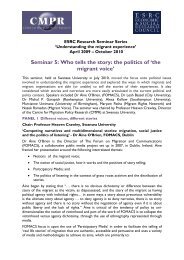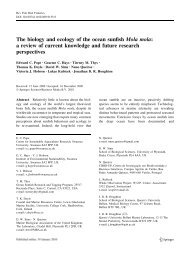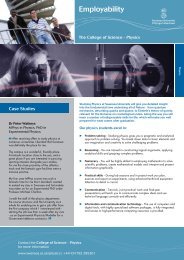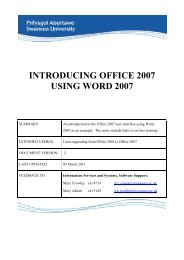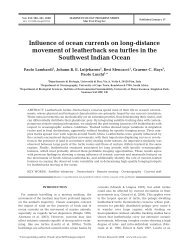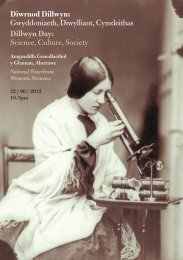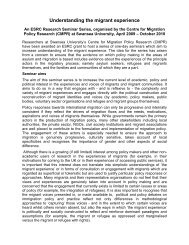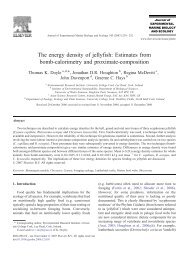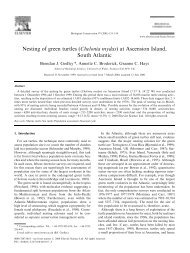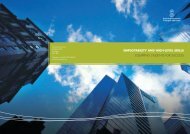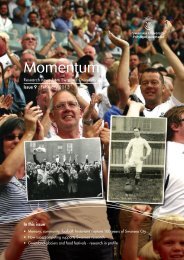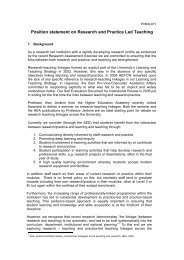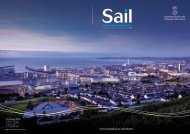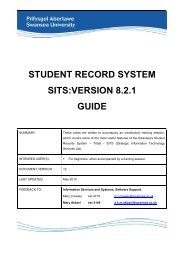Postgraduate Prospectus 2013 - Swansea University
Postgraduate Prospectus 2013 - Swansea University
Postgraduate Prospectus 2013 - Swansea University
Create successful ePaper yourself
Turn your PDF publications into a flip-book with our unique Google optimized e-Paper software.
History<br />
Entry requirements<br />
Normally a good Honours degree<br />
(first-class or 2.1) or equivalent in History<br />
or a related subject.<br />
English Language requirement:<br />
IELTS 6.5 (with a minimum of 5.5 in<br />
each component) or <strong>Swansea</strong> <strong>University</strong><br />
recognised equivalent.<br />
Assessment<br />
The Master’s degree is examined by<br />
assessed coursework and a dissertation.<br />
Scholarships and Bursaries<br />
A range of postgraduate scholarships and<br />
bursaries is available. For details, please<br />
visit: www.swansea.ac.uk/scholarships/<br />
<strong>Postgraduate</strong><br />
Full-time or part-time <strong>Postgraduate</strong><br />
Certificate (60 credits) or <strong>Postgraduate</strong><br />
Diploma (120 credits) is available.<br />
<strong>Postgraduate</strong> Diplomas<br />
and Certificates<br />
Full-time or part-time <strong>Postgraduate</strong><br />
Certificate (60 credits) or <strong>Postgraduate</strong><br />
Diploma (120 credits) is available.<br />
The <strong>Postgraduate</strong> community<br />
Master’s students are encouraged to become<br />
active members of <strong>Swansea</strong> <strong>University</strong>’s<br />
vibrant research community. The Research<br />
Institute for Arts and Humanities (RIAH) runs<br />
regular research seminars and lectures. The<br />
History and Classics <strong>Postgraduate</strong> Forum<br />
additionally runs an annual programme of<br />
research seminars, conferences and skills<br />
workshops, as well as social events. There<br />
are also opportunities for MA students to<br />
become involved in local historical research<br />
and conservation projects.<br />
How can I find out more?<br />
Visit our website:<br />
www.swansea.ac.uk/artsandhumanities<br />
Contact the Arts and Humanities<br />
<strong>Postgraduate</strong> Admissions Office:<br />
Email: pgahadmissions@swansea.ac.uk<br />
Tel: + 44 (0)1792 606752<br />
Visit the <strong>University</strong>:<br />
see page 174 for details<br />
Applications can be made online at:<br />
www.swansea.ac.uk/applyonline<br />
– see pages 176 – 177 for further<br />
information<br />
For details of the research degrees<br />
available in History, please see page 120.<br />
Master’s Degrees – History<br />
History challenges us to understand the<br />
past so that we might make sense of the<br />
present. It encourages us to think about<br />
how the past is studied, written about,<br />
and represented, how it has been kept<br />
alive for generations, and how it can be<br />
preserved for generations to come.<br />
History at <strong>Swansea</strong> offers four Master’s<br />
degrees which between them cover the<br />
major periods and civilisations from the<br />
Middle Ages to the modern day.<br />
These degrees will:<br />
• equip you with skills relevant for a<br />
rewarding career in a range of diverse<br />
fields, including museum and heritage<br />
work, teaching and research, the<br />
media, accountancy, banking,<br />
insurance, and marketing<br />
• consolidate your skills in historical<br />
research, enabling you subsequently to<br />
take a research degree<br />
• provide you with a range of intellectual,<br />
practical and personal transferable skills<br />
to enhance your employability<br />
How the degrees are structured<br />
All History schemes combine compulsory<br />
modules, which familiarise you with<br />
theories, trends and directions in the study<br />
of history and enhance your research skills,<br />
with a choice of optional modules. Where<br />
appropriate, students may choose one of<br />
their optional modules from among schemes<br />
other than those offered in History.<br />
The full-time course structure is split across<br />
the year with three modules offered in<br />
each academic semester (a total of six<br />
modules in Part One) and then a<br />
dissertation over the summer (Part Two).<br />
Depending on the scheme, students study<br />
two/three compulsory modules and three/<br />
four optional modules. The dissertation<br />
component is written on a specialist<br />
research topic of your choosing. Part-time<br />
students normally take the six modules over<br />
two years and write their dissertation in the<br />
third year.<br />
MA Early Modern History<br />
Students seeking to specialise in Early<br />
Modern History take the following<br />
compulsory modules:<br />
• New Departures in the Writing of<br />
History<br />
• Historical Methods and Approaches<br />
• Research Folder<br />
Optional modules available to students on<br />
the scheme include:<br />
• The Making of Modern Sexualities,<br />
1650-1800<br />
• People on the Move: The Forging of the<br />
Portuguese Overseas World, 1415-1808<br />
• Empire, Slavery and Liberty in the British<br />
Atlantic World, 1584-1808<br />
• From Princely Possessions to Public<br />
Museums<br />
• Venice and the Sea<br />
MA Medieval Studies<br />
The MA in Medieval Studies allows<br />
students to combine the study of Medieval<br />
History with the period’s literature and<br />
languages. Students take the following<br />
compulsory modules.<br />
• Introduction to Advanced Medieval<br />
Studies<br />
• Research Folder<br />
Optional modules available to students on<br />
the scheme include:<br />
• The Medieval Lyric<br />
• England’s Elite: Power, Culture and<br />
Gender in Late Medieval Britain<br />
• Medieval Manuscripts<br />
• Medieval Languages<br />
• The Urban Colonisation of Medieval<br />
Wales, 1066-1350<br />
MA Modern History<br />
Students wishing to specialise in the study<br />
of Modern History take the following<br />
compulsory modules:<br />
• New Departures in the Writing of History<br />
• Historical Methods and Approaches<br />
• Research Folder<br />
Optional modules available to students on<br />
the scheme include:<br />
• Collective Memories of War in<br />
Twentieth-Century Europe<br />
• Mountains: A Social and<br />
Cultural History<br />
• Popular Politics and Protest in Wales,<br />
1780-1850<br />
• Fascism and Culture<br />
• Communicating History<br />
MA History<br />
The MA in History is available to students<br />
who do not wish to specialise in any<br />
particular period or field. Students take<br />
the following compulsory modules:<br />
• New Departures in the Writing<br />
of History<br />
• Historical Methods and Approaches<br />
• Research Folder<br />
They may choose their optional<br />
modules from those available in other<br />
MA History schemes.<br />
“The facilities are excellent. As a postgraduate, I appreciate the use<br />
of separate rooms in both the library and the James Callaghan<br />
building. The IT resources are very effective, and enable me to work<br />
both at home and on campus with equal ease. The teaching has been<br />
excellent, and the willingness of staff to discuss matters at length is<br />
much appreciated. Having been away from education for 20 years,<br />
their help has been invaluable in overcoming my initial nerves about<br />
returning to study.<br />
”<br />
Graham Powell,<br />
MA Modern History<br />
66<br />
67



